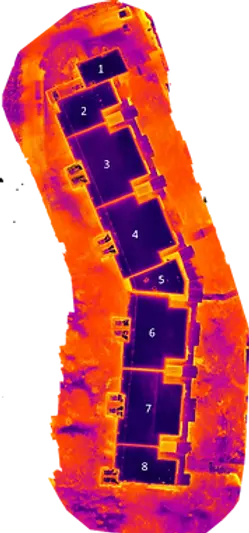

sUAS (DRONE) ROOF INSPECTION ADVANTAGES
Aerial imaging provides a number of advantages over traditional roof inspection process:
-
Safer - Minimizing boots-on-the-roof eliminates fall hazards and potential damage to your roof
-
Cheaper - A thermal inspection of your roof identifies areas of concern significantly better than a visual inspection. Find small problems before they become HUGE problems.
-
Faster - An sUAS (Drone) inspection can be accomplished significantly faster than deploying a team.

Commercial Roofing vs Residential Roofing
Drone (sUAS) roof inspections for residential roofing vs low slope/commercial roofing differ significantly. Residential roofing methods and materials are not generally compatible with thermal inspections methods for example. A visual (RGB) inspection of a non-walkable roof is certainly possible. Modern high resolution sensors allow inspectors to virtually inspect your roof from a safe distance and without the risk of injury or damaging to the roof during the inspection.
Low Slope/Commercial Roofing is ideal for both visual and thermal drone inspections. RGB imagery captured during daylight hours provides high definition imagery while thermal images, captured shortly after sunset, provide the ideal scenario for seeing below the surface.
Aerial Thermal Roof Inspection Advantages
Water infiltration often goes undetected until significant damage has already occurred. Detecting moisture infiltration as early as possible can be the difference between a minor inconvenience and catastrophic roof failure. A certified sUAS Thermographer can help.
AltiTerra's pilots are ITC Certified L1 sUAS Thermographers! The Infrared Training Institue (ITC) is the recognized leader in thermal certifications, and we've invested the time and effort to be the best.
Anyone can purchase a drone with a thermal camera. Understanding the impacts of elevation, angle, emissivity & wind speed is unique to airborne thermal imaging. Our report provides actionable data for your maintenance personal or roofing contractor.

Routine Inspections
There are several reasons why it is important to get your commercial roof inspected routinely:
Preventing Leaks and Damage
Regular inspections can help to identify and prevent leaks and damage to your roof, which can save you from costly repairs or replacements in the future.
Keeping up with Warranty Requirements
Many commercial roofing systems come with warranties, but in order to take advantage of these warranties, regular inspections are often required. By getting your roof inspected routinely, you can ensure that you are meeting the requirements of your warranty and protecting your investment.
Identifying Wear and Tear
Over time, a commercial roof can experience wear and tear from weather and other factors. Regular inspections can help to identify any areas of the roof that are showing signs of wear and tear, and address them before they become major issues.
Compliance with Safety Regulations
Some countries have regulations that require regular inspection of commercial roofs to ensure that they are safe and stable. Regular inspections can help to ensure that your roof is compliant with these regulations, and that your building is safe for tenants and visitors.
Maintaining Energy Efficiency
Regular inspections can help to identify areas where the roof is not properly insulated or sealed, which can lead to heat loss and higher energy costs. By identifying these issues and addressing them, you can help to maintain the energy efficiency of your building.
Cost-Effective
Routinely inspecting the roof can save money in the long run by identifying issues before they become more serious, and by extending the life of the roof.
Pre-buy Inspections
A thermal roof inspection before buying a commercial building can provide a number of advantages, including:
Providing a Benchmark for Future Inspections
A thermal roof inspection can provide a benchmark for future inspections, allowing you to track the condition of the roof over time and identify any changes or issues that may arise.
Providing a Peace of Mind
Knowing the condition of the roof and potential issues before buying a commercial building can give an investor peace of mind knowing that the building is in a good condition, and can also serve as a negotiation point in the purchase process.
Identifying Energy-Efficiency Issues
A thermal roof inspection can identify areas where the roof is not properly insulated or sealed, which can lead to heat loss and higher energy costs.
Cost-Effective
Thermal roof inspections are cost-effective compared to traditional inspection methods and can save money in the long run by identifying issues before they become more serious.
Identifying Potential Issues
A thermal roof inspection can identify potential issues with the roof such as leaks, missing insulation, or damaged areas. Identifying these issues early on can help to prevent costly repairs or replacements in the future.
When Should I Inspect My Roof?
Commercial roofs should be inspected at least once a year, and more frequently if the building is located in an area with harsh weather conditions or if the roof is showing signs of wear and tear.
It is also recommended that a commercial roof should be inspected after severe weather events such as heavy rain, snow, hail or high winds, as these can cause damage that may not be visible from the ground.
Additionally, it's important to schedule inspections at different times of the year, for example, during the spring and fall, to ensure that any issues caused by seasonal changes are identified and addressed.
It's also recommended to schedule an inspection before the rainy season or winter season starts, in order to identify any issues that could cause leaks or damage when the weather turns bad.
It's important to note that the type of roofing system, the age of the roof, and the environment in which the building is located are all factors that can affect the frequency of inspections. A professional roofing contractor can advise on the specific inspection schedule that is appropriate for a particular building.
